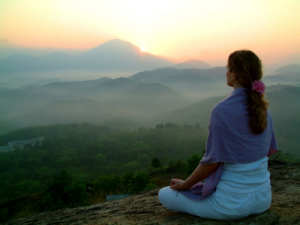
In the course of teaching Mindfulness-Based Stress Reduction, I have had the opportunity to hear first-hand how participation in the program has had an impact on the lives of many people. I know from my own experience of mindfulness practice how powerful it can be, but I often struggle with how to put that into words that really capture the experience. Fortunately, every now and then, one of our MBSR participants articulates it so poignantly and eloquently that I get a new look at how this practice changes lives. Recently, in a class taught by my colleagues Luis Morones and Amy Holte, one of their participants (we will call her Katie to protect her privacy, but she has given us permission to quote her) offered some wonderful feedback about her experience that we felt would be helpful to anyone considering embarking on a practice of mindfulness or in taking an MBSR course. Here is what she had to say:
"Thank you … for letting me attend most of the recent class (in which I had) a 60% attendance rate, which makes me laugh because in addition to suggesting kindness to ourselves and not always striving towards something (like counting attendance) a mere 60% of your class has changed at least 90% of my life. Although I have read only the opening of the book and made very little time to practice outside of the class, I cling to the concept of my breath always being there for me, or my feet being planted on the ground, and that has consistently redirected my next action in every situation. Pausing for a moment to just be present gives you the time to envision a desired outcome or at least remember your long-term goal in any given interaction.
“Always a mellow driver, I now am even more inclined to let others race along without getting upset (hard not to urge others to do the same). When working with my children, my focus is not on being right, but on getting them to decide for themselves what is right and why. When there is a work crisis, it is amazing how many people already have the solution but have not dared to allow themselves to solve it. Or friends who want you to solve their problems but don’t like your solutions, you realize they want the problem, and you can let go without guilt.
“Mostly I am finding that giving myself a moment to reflect keeps me calm and much more able to enjoy everyone’s company. Just this week, all five of my family were in 1) my bathroom, 2) my closet, 3) our bedroom, and in each instance I stopped myself from saying “why are you all here, stop following me” but thought instead, how wonderful that you want to be with me, that we trust each other and listen to each other and want to be together.”
Katie works in the same office space as that of the UCSD Center for Mindfulness, and her group recently experienced a significant reduction in their workforce. The stress of the process of “downsizing” was immense, and we were moved to extend the offer of free participation in MBSR to any of their group affected by these layoffs. Katie noted, “I know that Steve may have been thinking about laid off employees when he so generously offered us a space in your class, but for those of us left behind to pick up the pieces of the dozen or so people we’ve lost, it has been stressful in a different way – survivor guilt, maybe, and the inability to share about the quality and quantity of work when we should be grateful to still have the opportunity to serve. If I were going through all of these changes without the anchor of this class, my flame would definitely be starting to flicker!! It is also such a grounding experience to learn from those whose life situations harbor even darker days. I do so regret having missed the retreat, I felt like I was letting my classmates down, but it was unavoidable.
"I feel so empowered about how to live my life in a way that is healthier and happier and that has positive effects on those I love."
When I wrote to ask Katie’s permission to share what she wrote in her email to the teachers above, she responded with still more wonderfully descriptive feedback: “. . . essentially this experience has been the best gift since my wedding and the birth of my three healthy boys. That is really not an overstatement or overly enthusiastic – I feel so empowered about how to live my life in a way that is healthier and happier and that has positive effects on those I love, which was my original goal for joining the group. It will obviously take a lot more practice, but I can already tell that I am making better choices and just thinking before I speak (I can have a sharp tongue) is improving many relationships.”
It seems as though there is nothing else to say, as Katie said it all quite well! If someone you know could benefit from the practice of mindfulness or may be interested in taking a Mindfulness-Based Stress Reduction course, I highly recommend that you share this blogpost with that person. It could change their life in the way that it changed Katie’s.

